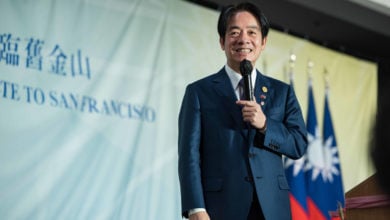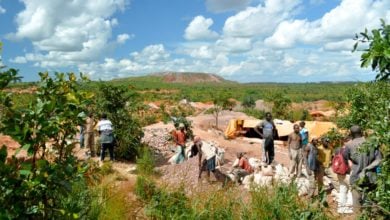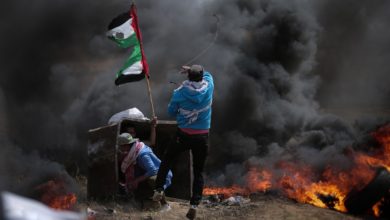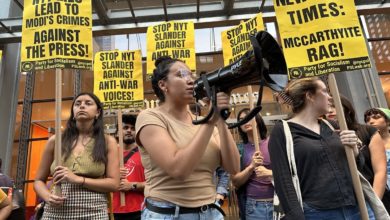Photo: South African President Cyril Ramaphosa at the summit venue alongside the flags of the BRICS countries. Credit: Presidency of South Africa
Today, a key summit opened in Johannesburg bringing together the leaders of Brazil, Russia, India, China and South Africa. These nations — the BRICS — are joined this year by dozens of leaders of additional countries, including the 23 that have now officially applied to join the bloc, like Indonesia, Iran and Nigeria. The summit is being closely watched around the globe because it deals with a central contradiction in international politics: the rising economic weight of countries that are home to the majority of the world’s people colliding with a world order set up and dominated by the imperialist powers.
The nations accustomed to controlling global politics — the “Group of Seven” consisting of the United States, Britain, France, Germany, Italy, Japan and Canada — view the BRICS with great suspicion. Individually, some members of the BRICS have positive or vacillating relations with the G7. India, for instance, participates in the “Indo-Pacific Quad” formation led by the United States that is aimed at confronting China. But collective action by the BRICS and like-minded countries of the Global South is seen as a challenge to the established architecture of world politics.
In the aftermath of the Second World War, key institutions and practices were set up to manage the exploitation of the globe by the big capitalist powers. The International Monetary Fund and the World Bank would impose anti-worker economic policies and ensure that formerly colonized nations would be unable to pursue an independent path of development. The United Nations would “end the scourge of war,” but only between the imperialist powers, to prevent the chaos of more world wars that would inevitably lead to the spread of socialist revolution. NATO would help accomplish the same end by grouping all the empires together in a single military alliance that would be used to menace or annihilate the emerging bloc of socialist states. The U.S. dollar would be the world reserve currency used in the bulk of international trade.
This world system persists to this day, and its absurdity is becoming increasingly apparent. The G7 states account for 10 percent of the world’s population, compared to 43 percent who live in the BRICS countries. The economies of the BRICS — which with the exception of Russia were pillaged for decades or centuries by the western powers — are growing much more rapidly than the G7. Adjusted for purchasing power, the G7’s share of the world economy declined from 42.3 percent to 30.3 percent between 2002 and 2022. For the BRICS, this figure increased from 19.3 percent to 31.7 percent.
There are several proposals under consideration at the BRICS summit to reshape the international order. A great deal of discussion revolves around “de-dollarization” and the possibility that the BRICS will launch their own currency. There has already been a growing willingness to conduct trade in national currencies as opposed to the U.S. dollar. The BRICS’ New Development Bank has renewed momentum now that it is under the leadership of former Brazilian President Dilma Rousseff. The NDB was established in 2014 with the aim of becoming a source of financing for countries’ development projects that could match the scale of the World Bank, but would not seek to infringe on the sovereignty of borrowers.
In many respects, the power of the BRICS bloc remains a potential, not an actuality. Up to this point, the NDB has funded only a handful of major initiatives. Fifty-eight percent of all the currency reserves in the world is held in dollars. Western and Japanese banks dominate world finance. Corporations in the G7 countries exercise similar dominance over the media, the global arms trade and most key natural resources. The United States and its allies are taking aggressive action to prevent technology transfer and maintain their high-tech edge. It will take a historic and drawn-out struggle to reverse these realities.
The world is racked by profound inequality. BRICS is not an instrument to address inequality within societies — it does not intend to challenge the exploitation of workers by capitalists to build socialism. But it does have the potential to create openings for this project by challenging imbalances among nations in the global economy and diplomacy. The BRICS summit now underway reflects the fact that the unequal international order has become intolerable for a growing majority of humanity.






